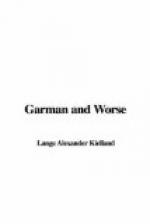Uncle Richard had on this occasion led the conversation in a direction which he knew would be at the same time entertaining and interesting. The subject was the position of the country with regard to other nations. Mr. Hiorth had been in Paris under Louis Philippe, and Delphin had two years previously made a summer tour through Europe, while the schoolmaster had been at the University of Copenhagen. Delphin’s account of his travels was most animated, and culminated in the greatest admiration for Paris. The magistrate maintained that Paris was a dangerous, restless, and vicious town. This was the result of his observation in 1847, and it was generally allowed that since that time it had become even worse. Aalbom vainly tried to get in something about Thorwaldsen’s museum.
The conversation began to get lively. The attache distributed his aid with the greatest impartiality, and winked knowingly at Delphin, when to all appearances he had quite gone over to the magistrate’s side. Each point as it arose was discussed with the greatest eagerness, until they arrived at woman’s position in society. The magistrate was very strong on the subject of French immorality, but he was unluckily obliged to curtail his remarks on account of the ladies. Aalbom, who was able to take up a firm position on the ground of his acquaintance with “The Origin and History of the French Language,” came to the assistance of his friend with a string of the most frightful quotations from Rabelais to Zola. Both then began to compare the women of their own country with those of Northern Europe generally, and managed to make the comparison a very favourable one, holding up their countrywomen as veritable heroines; and as both Richard Garman and Delphin were far too gallant to dispute their theory, so the other two had full enjoyment of their triumph.
Jacob Worse now got up and joined the group. He had not been able to help partly overhearing the conversation, and ruffled as he was by Rachel’s accusations, he could no longer keep silence. The Consul smiled as he joined the others, and said in a low tone, “I will keep my eye upon you, and if it gets too hot, will come to your assistance.”
From the moment Jacob Worse began to take part in the conversation, the attache felt that the reins were slipping out of his hands. Worse went at it hammer and tongs; not that he raised his voice, or used unbecoming expressions, but his views were so subversive and so original, that the others were forthwith reduced to silence. At the first onset he brushed aside all the nonsense about Norwegian women, and that sort of thing, and went on boldly to consider the position of woman generally with regard to man. The magistrate asked him superciliously if he meant them to understand that he was in favour of emancipation; and when Worse answered that he was, the magistrate asked him with a smile how he thought he would be treated by an “emancipated wife.”




